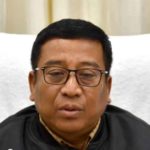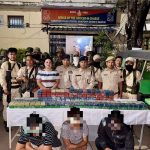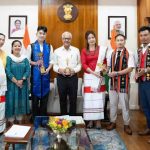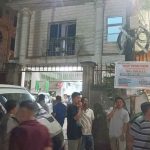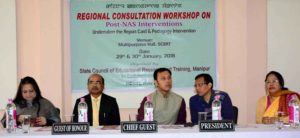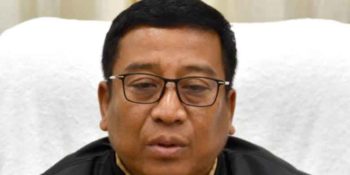Imphal, January 29, 2018 (DIPR): Education Minister Shri Thokchom Radheshyam opined the need to conduct a comparative study of the schools in hills and valleys, so that, a teaching method could be designed to lessen the issue of language barrier faced by the teachers and students specially at the Primary Stage for maximum learning. The Minister said Manipur is inhabited by 36 recognized ethnic groups speaking different languages.
He was speaking as Chief Guest at the inauguration of two days Regional Consultation Workshop on Post-NAS Interventions, Undertaken the Report Card and the Pedagogy Intervention, at the Multipurpose Hall, Directorate of State Council of Educational Research and Training, SCERT, Lamphelpat. The workshop is jointly organized by SCERT, Manipur and National Council of Educational Research and Training, NCERT, New Delhi.
Th. Radheshyam while appreciating the shifting in focus of student learning from content to competencies, he said, it will enhance the student’s competency in terms of communication, innovation and in finding solutions. Citing NASA ‘s Space Settlement Competition, Awardee and Class 10 Student Tapaswini Sharma for her project Kirithra Orbiss, he said that the text book and scoring good mark is not enough rather, the students should be injected and motivated to think to become innovative. He appealed the participants to make the classrooms innovative and research oriented so that the young minds could be trained to think through motivations and guidance.
Explaining ‘learning outcome’, Prof. Hrushikesh Senapaty, Director NCERT, said that it is a paradigm shift in teaching – learning process, shifting the focus from content mastery to competency mastery. It aims to develop in children certain skills of problem solving ability, creativity, critical thinking and communication skill preparing them for 21st century to imbibe the quality of good human being and enable to compete in the world.
Post-NAS Interventions, he explained is an accurate assessment of the learning outcomes at different stages of education that can provide important insights as to whether the inputs made into the elementary education system had helped in improving the educational health of the nation.
National Achievement Survey, NAS, has been conducting by the NCERT since 2001, the largest in the country and also amongst the world. The NAS 2017 will help in facilitating evidence based planning for ensuring quality in education, said Prof. Indrani Bhaduri, Head, Educational survey Division and National Coordinator, NAS.
The survey has been conducted in 703 district of the country covering all the states and union territories covering 2.2 million children from 1, 20, 000 schools. The workshop was attended by delegates from all States of North East, New Delhi, Jammu & Kashmir, officials of SSA and SCERT, Manipur.



